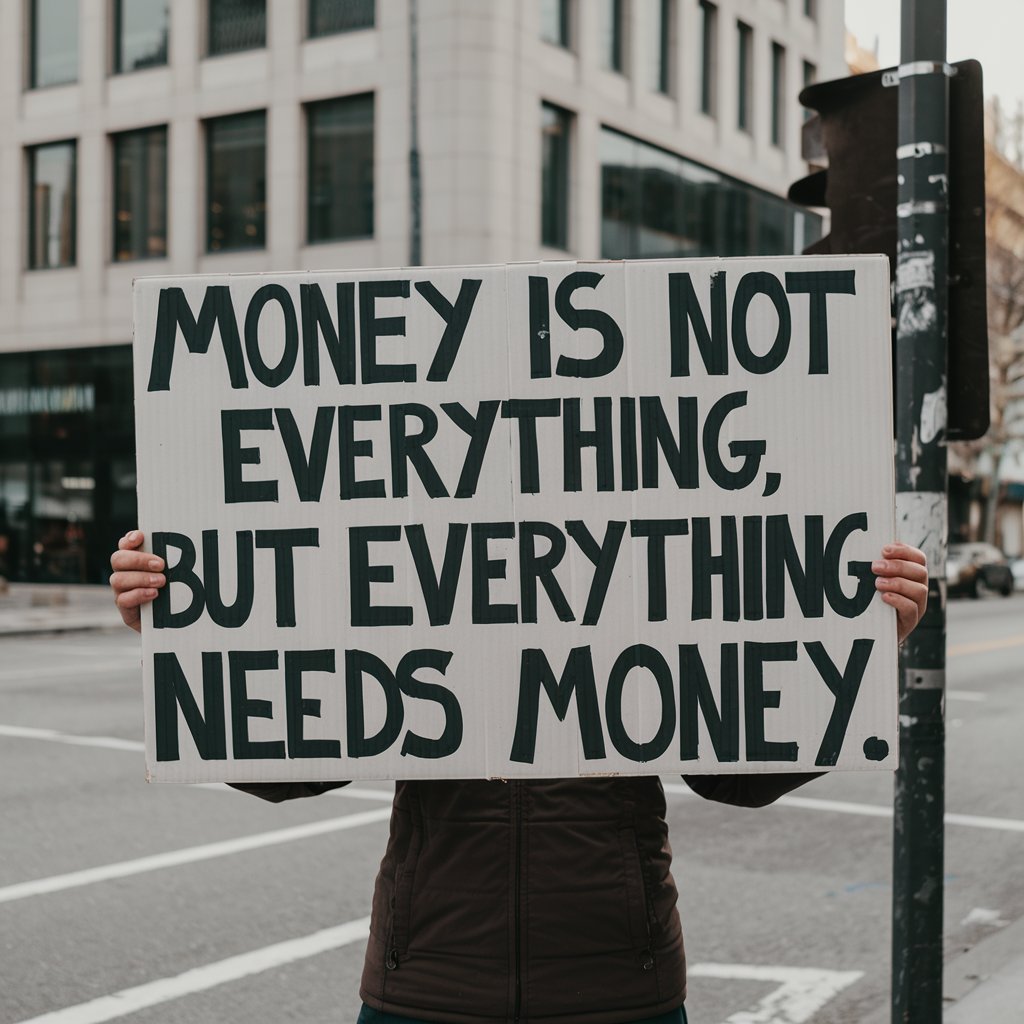
The phrase Money is not everything, but everything needs money is true.
Let me show you an example of how money is universal in everything you do.
Imagine your life is a car, and the different gears are education, health, happiness, financial freedom, love, and many others.
In the car, the gearbox helps to transmit power to different gears. But in life, money helps to maintain these gears at their best.
So without money, struggles can be overwhelming. And your life will be stuck in survival mode.
At times, insufficient money can even jeopardise these foundations of life.
Indeed, money is not everything in life, as other things such as love, friendships, and health are also important. But money is necessary.
Whether you want to celebrate an occasion with your family by going out, cooking at home, or a vacation with friends, money plays a crucial role in making them happen, even when the experiences with your family and friends are more important than money.
Money is a universal document with the same purpose: to keep the wheels running.
Since money plays a crucial role in building other gears in life, shouldn’t we find out why it is that important?
Let’s find out why money is important in our lives and also why it is not the key to happiness.
In the modern world, money is not just a medium of exchange; it is a universal language everyone is familiar with. If you go to any corner of the world, money talks.
We may not realise how money influences our experiences because it is a silent engine that makes life better.
Imagine, education? Needs money. Better healthcare? Needs money. Achieving a dream? Needs money. In one way or another, money opens doors to accessing these.
Money might not be able to purchase peace, love, or happiness. Right?
However, money can help you get rid of the ongoing struggle to make ends meet and ease your financial worries.
Money brings financial stability, security, and the freedom to pursue other interests without any worries.
If you are earning sufficient money. Then you will have the time to cherish other things in your life.
But if you don’t, you will be constantly worried about how to make it in order to provide for and protect your family and loved ones.
Money is so powerful that it can make you feel like money is everything in life. It can even influence you to think that money is more important than love and other principles of life.
But do you believe that money is more significant than love? And is money the most supreme factor in life?
If you do, then you are in serious trouble.
Let me tell you that money has two faces. And money is not everything in life.
While money provides financial security and stability, having only money and no other things, such as love or friendship, can leave you lonely, dissatisfied, materially possessed, and empty.
You will only realise this if you are blinded by money.
You don’t want to live your life solitary in a big house with a pool of money and no one to share your thoughts or experiences with. Right?
If yes, then the key to a healthy life is striking a balance between money and other principles in life.
Keep reading to find out how to find the balance.
Having huge wealth doesn’t mean you are rich if you do not have the means to cherish your wealth. Healthy relationships, work-life balance, family, and feeling fulfilled are the real wealth of life. While money can blind you from achieving these important things in life, it is crucial to find the right balance between them.
Here is a detailed guide on how to find the right balance.
Identify what truly matters to you. It could be anything from families, relationships, travel, or career. Making a list of things will help you determine their value and rank them. Prioritise what is important to you and contribute time, energy, and resources to build a connection.
Determine financial goals that align with your life goals. If your life goals involve spending time with your loved ones or vacationing with friends, then prioritise saving money for spending time with them.
Ensure that you prioritise achieving these goals as you earn consistently. Specifying a budget that spends money for meaningful purposes will help you achieve meaningful dreams.
When you have enough, you may not need other people’s help to do things. But that doesn’t mean that you cut off people from your life just because they are not needed financially.
No matter how much wealth you accumulate, surround yourself with people who care about you. Share the moments with those who matters to you.
Strong relationships offer emotional support, companionship, and shared joy, which money cannot provide.
Give importance to your health. As we grow older, our health gets deterred. Even if you have a fortune of wealth, if you do not have the health to spend this fortune, then what is the point of having a fortune?
Therefore, prioritise your healthcare from an early age. Spend your money and time on healthy diets, getting proper sleep, and living in clean environments. Practice stress-relief activities like yoga, exercising, or medication.
Check your health by conducting medical tests to prevent any possible expensive medical issues later. Prioritise living a healthy life while pursuing financial success.
Invest your time and money in experiences rather than in materials. Different experiences open doors for new opportunities as well as create memories and enhance personal growth.
Experiences enrich your life, learning new things that broaden your perspective. It is more rewarding than possessing materials, as it encourages emotional well-being.
In the journey of life, money isn’t everything, but everything needs money to keep moving forward.
While money serves as a powerful tool for achieving financial security, accessing opportunities, and improving quality of life, it is not the sole factor that determines happiness or fulfilment.
True richness lies in balancing wealth with meaningful relationships, good health, personal growth, and memorable experiences.
Neglecting other aspects of life in pursuit of wealth can lead to loneliness and dissatisfaction, no matter how much money you accumulate.
On the other hand, living without financial stability can overshadow life’s joys with constant worry. The key is to strike a balance to have an enriching life.
Ultimately, by aligning financial goals with personal values and nurturing what truly matters, prioritising relationships and health, you can create a life that is not only prosperous but also deeply fulfilling.
Disclaimer: The information provided in this blog is for educational and informational purposes only and should not be considered as financial or investment advice. Stock market investments are subject to market risks, and past performance is not indicative of future results. Readers are encouraged to do their own research and consult with a licensed financial advisor before making any investment decisions. The author and publisher are not liable for any financial losses or damages incurred from following the information provided in this blog.

Hashim Manikfan
Hashim Manikfan is a professional financial content writer with extensive experience in creating engaging and informative articles on a wide range of financial topics. With academic background in Communication and Journalism, Hashim has published numerous articles aimed at educating readers on essential financial principles. His work covers areas such as financial markets, investment strategies, economic trends, and more. His writing style ensures complex topics are accessible and interesting, making financial literacy attainable for a broad audience.
